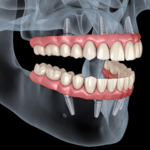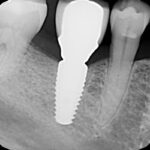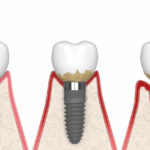Dental implants are one of the most successful and life-changing solutions in modern dentistry. They offer a stable, natural-looking replacement for missing teeth and can last a lifetime when properly cared for. However, one condition that threatens the longevity of dental implants is peri-implantitis.
In this blog, we will dive deep into what peri-implantitis is, what causes it, how to prevent it, and what treatment options are available if it occurs. Understanding this condition is essential for anyone who has or is considering dental implants.
What Is Peri-Implantitis?
Peri-implantitis is an inflammatory disease that affects the soft and hard tissues surrounding a dental implant. Much like periodontitis in natural teeth, this condition leads to the progressive loss of supporting bone around the implant.
Signs and symptoms include:
- Bleeding on probing
- Swelling and redness of the gum tissue
- Pus around the implant
- Increased pocket depth
- Implant mobility (in severe cases)
- Bad taste or odor
Left untreated, peri-implantitis can result in implant failure, necessitating removal and replacement of the implant.
What Causes Peri-Implantitis?
The main cause of peri-implantitis is the accumulation of bacterial plaque around the implant. However, several contributing risk factors can increase the likelihood of developing this condition:
- Poor oral hygiene
- Smoking
- History of periodontal disease
- Diabetes or other systemic conditions
- Excessive biting forces (bruxism)
- Inadequate prosthetic design
- Improper placement of the implant
Understanding these factors allows both patients and dental professionals to take proactive steps to reduce risk.
How Is Peri-Implantitis Diagnosed?
Diagnosis typically involves a combination of clinical examination and radiographic analysis. Dentists will assess pocket depths around the implant, look for bleeding or pus on probing, and take X-rays to evaluate bone levels.
Advanced diagnostic tools, such as cone-beam CT scans and microbial testing, may also be used in more complex cases to understand the extent of the disease and plan treatment accordingly.
Preventing Peri-Implantitis
The best way to deal with peri-implantitis is to prevent it in the first place. Preventative measures include:
- Practicing excellent oral hygiene: brushing twice daily, flossing, and using an antimicrobial rinse
- Regular professional cleanings and check-ups every 3–6 months
- Avoiding smoking and limiting alcohol intake
- Managing systemic health conditions like diabetes
- Ensuring proper prosthetic design and fit
- Using night guards if you grind your teeth
Your dentist may also recommend specialized cleaning tools, such as interdental brushes or water flossers, to help maintain the health of your implants.
Treatment Options for Peri-Implantitis
If peri-implantitis is detected early, treatment is often more successful. Treatment approaches vary depending on the severity of the condition:
- Non-Surgical Treatment:
- Mechanical debridement (cleaning the implant surface)
- Antibacterial or antiseptic therapy (chlorhexidine rinses, local antibiotics)
- Laser therapy to reduce bacterial load
- Surgical Treatment:
- Flap surgery to access and clean the infected area
- Regenerative procedures such as bone grafting
- Resective surgery to reshape the bone
- Implant Removal:
- In advanced cases where bone loss is extensive and the implant is mobile, removal may be the only viable option
What to Expect During Treatment
Patients should expect multiple appointments and close monitoring over several months. Healing times vary, and your dentist will recommend the best course of action depending on how your body responds to treatment.
Pain management, antibiotic therapy, and temporary adjustments to your oral hygiene routine may be necessary during recovery.
The Long-Term Outlook
The prognosis of peri-implantitis depends on how early it is detected and how aggressively it is treated. With early intervention and excellent oral care, many implants can be preserved and maintained long-term.
For patients who’ve had an implant removed, reimplantation may be possible after the area has fully healed and bone has been regenerated.
Conclusion
Dental implants can offer decades of function and beauty, but they are not immune to complications. Peri-implantitis is a serious condition, but with knowledge, prevention, and prompt treatment, it can be effectively managed.
If you have a dental implant or are considering one, make sure to maintain regular visits with your dentist and practice diligent at-home care. Early detection and action can mean the difference between saving or losing your implant.
Stay proactive, stay informed, and protect your smile for years to come.







